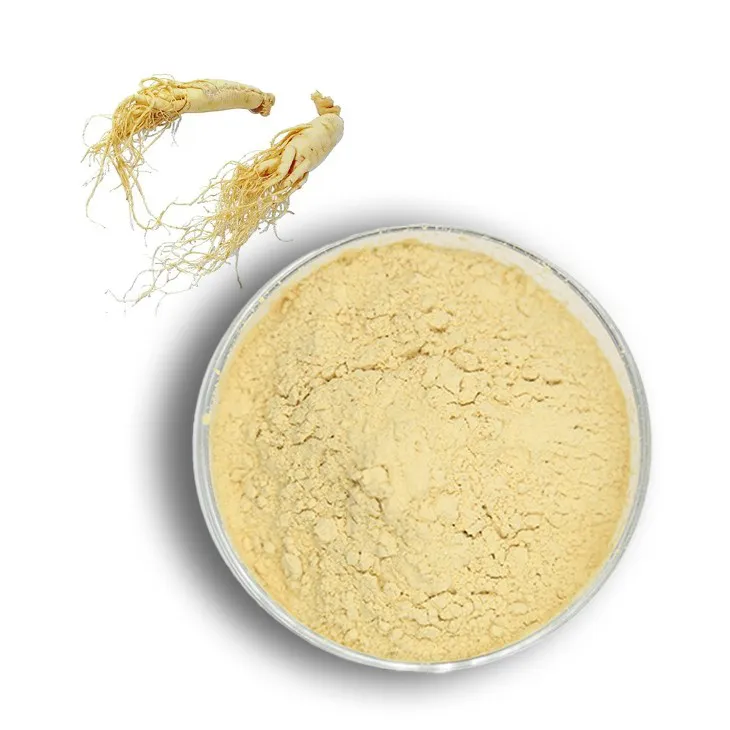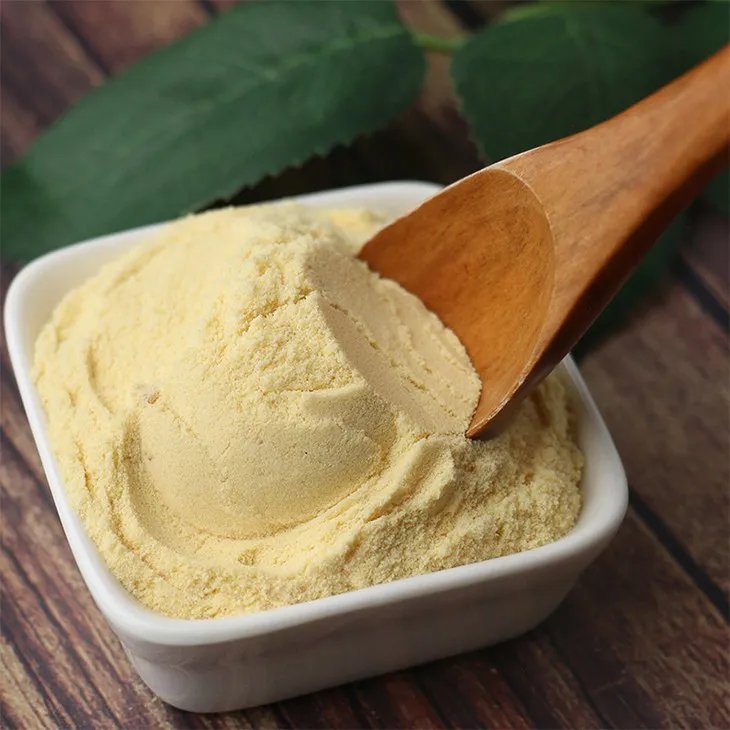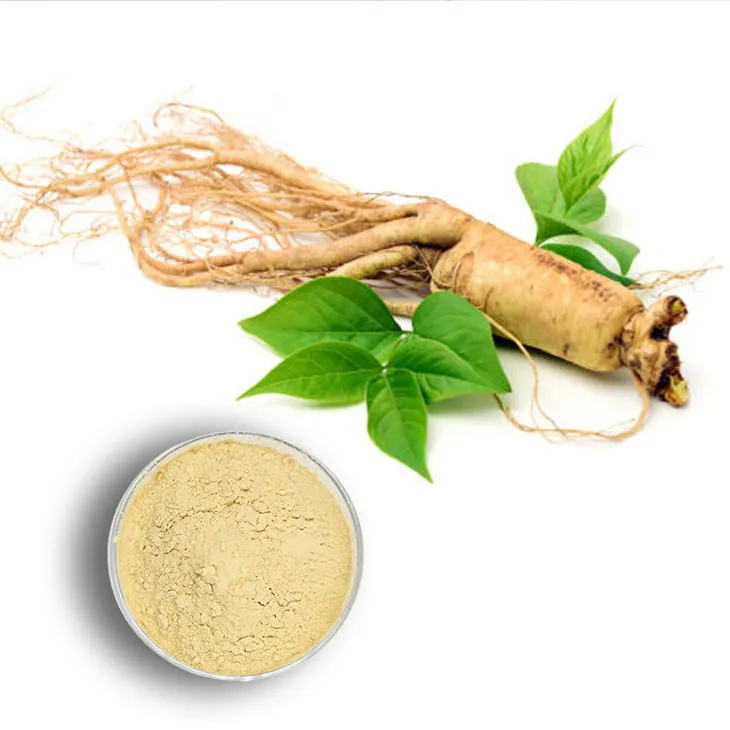- 0086-571-85302990
- sales@greenskybio.com
4 Things Consumers and Manufacturers Should Know about Ginseng Root Extract
2024-12-20

1. Benefits of Ginseng Root Extract
Ginseng Root Extract, particularly from the Panax ginseng species, has a long history of use in traditional medicine and is now being recognized for its numerous health benefits in modern scientific research.
1.1 Boosting Energy and Reducing Fatigue
One of the most well - known benefits of Ginseng Root Extract is its ability to enhance energy levels. It contains compounds that can stimulate the central nervous system in a gentle way, without the jittery effects often associated with stimulants like caffeine. This makes it an ideal natural supplement for those looking to increase their productivity or combat fatigue. For example, in a study of individuals with chronic fatigue syndrome, regular consumption of ginseng root extract showed significant improvements in energy levels and a reduction in feelings of tiredness.
1.2 Immune System Support
Ginseng root extract also plays a role in strengthening the immune system. It contains polysaccharides and other bioactive components that can enhance the activity of immune cells such as macrophages and lymphocytes. These cells are crucial for the body's defense against pathogens, including bacteria, viruses, and fungi. By boosting the immune system, ginseng root extract may help the body fend off infections more effectively and reduce the frequency and severity of illness.
1.3 Cognitive Function Improvement
There is growing evidence that ginseng root extract can have positive effects on cognitive function. It may improve memory, concentration, and mental clarity. The active compounds in ginseng are thought to enhance neurotransmitter function in the brain, particularly acetylcholine, which is important for learning and memory processes. In addition, ginseng root extract has been shown to have antioxidant properties in the brain, protecting neurons from oxidative stress and potentially delaying the onset of age - related cognitive decline.
1.4 Anti - inflammatory Properties
Chronic inflammation is associated with a variety of health problems, including heart disease, arthritis, and certain cancers. Ginseng root extract has anti - inflammatory properties, which can help reduce inflammation in the body. It does this by modulating the production of inflammatory cytokines and enzymes. By reducing inflammation, ginseng root extract may contribute to the prevention and management of these chronic diseases.

2. Quality Control in Ginseng Root Extract Production
For both consumers and manufacturers, ensuring the quality of ginseng root extract is of utmost importance.
2.1 Standardization of Active Compounds
Ginseng root extract contains a variety of active compounds, such as ginsenosides. Standardization of these compounds is crucial to ensure the consistency and effectiveness of the extract. Manufacturers should use reliable analytical methods, such as high - performance liquid chromatography (HPLC), to measure and control the levels of ginsenosides in the extract. This helps to guarantee that consumers are getting a product with a known and consistent potency.
2.2 Purity and Contaminant Testing
Ginseng root extract should be free from contaminants such as heavy metals (e.g., lead, mercury), pesticides, and microbial contaminants. Manufacturers need to conduct thorough testing to ensure the purity of the extract. This may involve using techniques like inductively coupled plasma - mass spectrometry (ICP - MS) for heavy metal analysis and microbiological assays for detecting bacteria, yeasts, and molds. Consumers should look for products that have been tested and certified for purity by reliable third - party laboratories.
2.3 Good Manufacturing Practices (GMP)
Adherence to Good Manufacturing Practices is essential in the production of ginseng root extract. GMP ensures that the manufacturing process is carried out in a clean, controlled, and hygienic environment. It includes aspects such as proper handling of raw materials, quality control at every stage of production, and proper documentation. Manufacturers that follow GMP standards are more likely to produce high - quality ginseng root extract products.

3. Sourcing of Ginseng Root Extract
The source of ginseng root extract can significantly impact its quality and properties.
3.1 Geographical Origin
Ginseng is native to certain regions, and different geographical origins can produce ginseng with different characteristics. For example, Korean ginseng (Panax ginseng C. A. Mey.) is highly regarded for its quality. The soil, climate, and growing conditions in Korea are thought to contribute to the unique composition of Korean ginseng, which may have higher levels of certain active compounds. However, ginseng is also grown in other parts of the world, such as China and North America. Each origin has its own advantages and potential differences in the quality of the ginseng root extract.
3.2 Organic vs. Conventional Sourcing
Consumers may have a preference for either organic or conventional ginseng root extract. Organic ginseng is grown without the use of synthetic pesticides, fertilizers, or genetically modified organisms (GMOs). It is often considered more environmentally friendly and may be perceived as a healthier option by some consumers. However, organic ginseng production can be more challenging and may result in lower yields. Conventional ginseng, on the other hand, may be more widely available and potentially more cost - effective. Manufacturers need to be transparent about the sourcing method and provide accurate information to consumers.
3.3 Sustainable Sourcing
With the increasing demand for ginseng root extract, sustainable sourcing has become a crucial concern. Ginseng is a slow - growing plant, and over - harvesting can lead to depletion of wild ginseng populations. Many regions now have regulations in place to protect wild ginseng, and sustainable cultivation practices are being promoted. Manufacturers should ensure that their ginseng root extract is sourced from sustainable sources, either through responsible wild - harvesting or well - managed cultivation operations. This not only helps to protect the environment but also ensures the long - term availability of ginseng for future generations.

4. Potential Side Effects of Ginseng Root Extract
While ginseng root extract has many potential benefits, it is also important to be aware of its possible side effects.
4.1 Insomnia and Nervousness
Due to its stimulant properties, ginseng root extract may cause insomnia or nervousness in some individuals, especially if consumed in large amounts or close to bedtime. People who are sensitive to stimulants should be cautious when using ginseng products and may need to adjust the dosage or time of consumption.
4.2 Blood Pressure and Heart Rate Changes
In some cases, ginseng root extract can affect blood pressure and heart rate. It may cause a slight increase in blood pressure or heart rate, which could be a concern for individuals with pre - existing cardiovascular conditions. Therefore, it is advisable for those with heart problems to consult a healthcare provider before using ginseng root extract.
4.3 Gastrointestinal Disturbances
Some people may experience gastrointestinal side effects such as nausea, vomiting, or diarrhea after consuming ginseng root extract. These symptoms are usually mild and may subside with a reduction in dosage or discontinuation of the product. However, if the symptoms persist or are severe, medical attention should be sought.
4.4 Hormonal Effects
There is some evidence that ginseng root extract may have hormonal effects. It may interact with hormones in the body, particularly estrogen and testosterone. This could potentially affect hormonal balance, especially in women. However, more research is needed to fully understand the extent of these hormonal interactions and their implications.

FAQ:

What are the main benefits of Panax ginseng root extract?
Panax ginseng root extract has several potential benefits. It may help boost energy levels, improve cognitive function, enhance the immune system, and increase resistance to stress. Some studies also suggest it may have antioxidant properties that can contribute to overall health.
How can manufacturers ensure the quality of Panax ginseng root extract?
Manufacturers can ensure quality through several methods. Firstly, they should source the ginseng from reliable suppliers. They need to follow strict extraction processes to maintain the integrity of the active compounds. Quality control tests such as purity analysis, potency determination, and microbiological testing should be carried out regularly. Also, compliance with relevant industry standards and regulations is crucial for ensuring high - quality Panax ginseng root extract.
Where is Panax ginseng typically sourced from?
Panax ginseng is mainly sourced from regions in Asia, such as China, Korea, and Russia. These areas have suitable climates and soil conditions for the growth of ginseng. In China, for example, certain mountainous regions are well - known for ginseng cultivation.
What are the potential side effects of Panax ginseng root extract?
Some potential side effects of Panax ginseng root extract include insomnia, high blood pressure, and digestive issues in some individuals. It may also interact with certain medications. People with pre - existing medical conditions or those taking medications should consult a healthcare provider before using ginseng root extract.
How can consumers identify high - quality Panax ginseng root extract products?
Consumers can look for products that are from well - known brands with a good reputation. Check for third - party testing certifications which can indicate the quality and purity of the extract. The product label should clearly state the source of the ginseng, the extraction method, and the concentration of active ingredients. Also, reading customer reviews can provide some insights into the effectiveness and quality of the product.
Related literature
- Beneficial Effects of Panax ginseng: A Review of its Pharmacological Properties"
- "Quality Control of Ginseng Extracts in the Dietary Supplement Industry"
- "Sourcing and Sustainability of Panax ginseng: Current Challenges and Future Prospects"
- "Potential Side Effects and Precautions of Ginseng Consumption"
TAGS:
Where is Panax ginseng typically sourced from?
Panax ginseng is mainly sourced from regions in Asia, such as China, Korea, and Russia. These areas have suitable climates and soil conditions for the growth of ginseng. In China, for example, certain mountainous regions are well - known for ginseng cultivation.
What are the potential side effects of Panax ginseng root extract?
Some potential side effects of Panax ginseng root extract include insomnia, high blood pressure, and digestive issues in some individuals. It may also interact with certain medications. People with pre - existing medical conditions or those taking medications should consult a healthcare provider before using ginseng root extract.
How can consumers identify high - quality Panax ginseng root extract products?
Consumers can look for products that are from well - known brands with a good reputation. Check for third - party testing certifications which can indicate the quality and purity of the extract. The product label should clearly state the source of the ginseng, the extraction method, and the concentration of active ingredients. Also, reading customer reviews can provide some insights into the effectiveness and quality of the product.
Related literature
- Beneficial Effects of Panax ginseng: A Review of its Pharmacological Properties"
- "Quality Control of Ginseng Extracts in the Dietary Supplement Industry"
- "Sourcing and Sustainability of Panax ginseng: Current Challenges and Future Prospects"
- "Potential Side Effects and Precautions of Ginseng Consumption"
TAGS:
How can consumers identify high - quality Panax ginseng root extract products?
Consumers can look for products that are from well - known brands with a good reputation. Check for third - party testing certifications which can indicate the quality and purity of the extract. The product label should clearly state the source of the ginseng, the extraction method, and the concentration of active ingredients. Also, reading customer reviews can provide some insights into the effectiveness and quality of the product.
Related literature
- Beneficial Effects of Panax ginseng: A Review of its Pharmacological Properties"
- "Quality Control of Ginseng Extracts in the Dietary Supplement Industry"
- "Sourcing and Sustainability of Panax ginseng: Current Challenges and Future Prospects"
- "Potential Side Effects and Precautions of Ginseng Consumption"
TAGS:
- ▶ Hesperidin
- ▶ Citrus Bioflavonoids
- ▶ Plant Extract
- ▶ lycopene
- ▶ Diosmin
- ▶ Grape seed extract
- ▶ Sea buckthorn Juice Powder
- ▶ Fruit Juice Powder
- ▶ Hops Extract
- ▶ Artichoke Extract
- ▶ Mushroom extract
- ▶ Astaxanthin
- ▶ Green Tea Extract
- ▶ Curcumin
- ▶ Horse Chestnut Extract
- ▶ Other Product
- ▶ Boswellia Serrata Extract
- ▶ Resveratrol
- ▶ Marigold Extract
- ▶ Grape Leaf Extract
- ▶ New Product
- ▶ Aminolevulinic acid
- ▶ Cranberry Extract
- ▶ Red Yeast Rice
- ▶ Red Wine Extract
-
Tamarind extract powder
2024-12-20
-
Tongkat Ali Extract Powder
2024-12-20
-
Grape Seed Extract
2024-12-20
-
Beta Carotene
2024-12-20
-
Tongkat Ali Extract
2024-12-20
-
Phellodendron Extract
2024-12-20
-
Maca Extract
2024-12-20
-
Yohimbine Bark Extract
2024-12-20
-
Natural grape seed extract
2024-12-20
-
Saw Palmetto Extract
2024-12-20





















